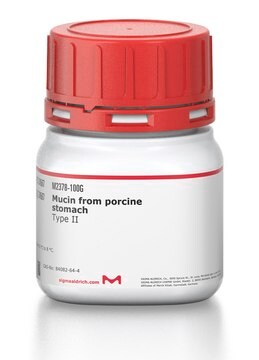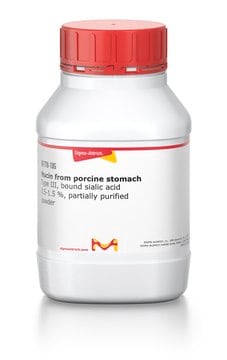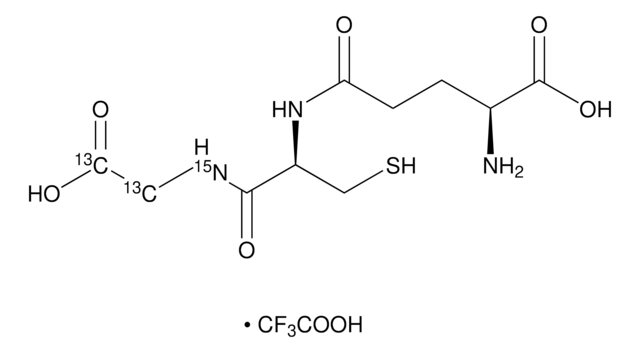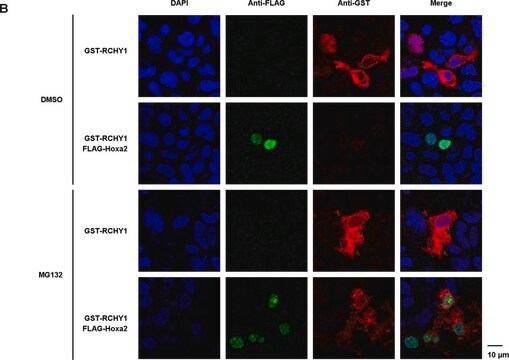G5017
Glycophorin Predominantly glycophorin A from blood type MN
lyophilized powder
Se connecterpour consulter vos tarifs contractuels et ceux de votre entreprise/organisme
About This Item
Produits recommandés
Source biologique
human blood (type MN)
Niveau de qualité
Forme
lyophilized powder
Solubilité
soluble 1.00-1.10 mg/mL
H2O: soluble, clear to hazy
Numéro d'accès UniProt
Température de stockage
−20°C
Informations sur le gène
human ... GYPA(2993)
Description générale
Glycophorin (GYPA), a sialoglycoprotein, is present in human erythrocytes that carry antigens M and N of the MN blood group. The GYPA gene is mapped to human chromosome 4q31.21.
Glycophorin A cconsists of a glycosylated extracellular domain, a single transmembrane α-helix and a cytoplasmic COOH-terminal domain.
Application
Glycophorin A (GpA) is used as a model system for extensive experimental, theoretical, and simulation studies focusing on TM protein association. Glycophorin A is used to study the mechanism of kinase activation in the receptor for colony-stimulating factor 1. It is used to analyse glycoproteins separated by two-dimensional gel electrophoresis.
Glycophorin Predominantly glycophorin A from blood type MN has been used:
- as a standard in Amide-80 column size-based separation for the characterization of plasma-type O-linked sugar chains
- to screen the P. falciparum phage library using biopanning method,
- as a phosphocholine-free component to test its reactivity with antibodies over a saccharide-bound enzyme-linked immunosorbent assay (ELISA)
Actions biochimiques/physiologiques
Glycophorin (GYPA) is involved in the mode of entry of the Plasmodium falciparum parasite into erythrocytes. It is also implicated in intraplaque hemorrhage as well as in the macrophage infiltration in coronary atheromas.
A membrane glycoprotein with several isoforms that interact with other membrane proteins to confer shape and antigenicity to erythrocytes.
Clause de non-responsabilité
Ce produit, destiné à la recherche scientifique, est soumis à une réglementation spécifique en France, y compris pour les activités d′importation et d′exportation (Article L 1211-1 alinéa 2 du Code de la Santé Publique). L′acheteur (c′est-à-dire l′utilisateur FINAL) est tenu d′obtenir une autorisation d′importation auprès du ministère français de la recherche, mentionné à l′article L1245-5-1 II du Code de la Santé Publique. En commandant ce produit, vous confirmez détenir l′autorisation d′importation requise.
Code de la classe de stockage
11 - Combustible Solids
Classe de danger pour l'eau (WGK)
WGK 3
Point d'éclair (°F)
Not applicable
Point d'éclair (°C)
Not applicable
Faites votre choix parmi les versions les plus récentes :
Déjà en possession de ce produit ?
Retrouvez la documentation relative aux produits que vous avez récemment achetés dans la Bibliothèque de documents.
Hajime Mizukami et al.
Journal of human genetics, 50(12), 667-670 (2005-10-06)
Ten alleles (five M and five N alleles) of the MN blood group system with normal antigenicity were found by sequencing the glycophorin A (GPA) gene. This study demonstrates the systematic classification of these alleles to major or minor variations
N H Packer et al.
Electrophoresis, 19(6), 981-988 (1998-06-25)
Two-dimensional (2-D) electrophoresis is the preferred method for separating the glycoforms of proteins. The isoforms usually present as 'trains' of spots in the first dimension and may also differ in molecular weight. The primary goal for analyzing the carbohydrate content
Alba Fernández-Sánchez et al.
Immunology letters, 123(2), 125-131 (2009-05-12)
The immunization of BALB/c mice with heat-killed cells of Streptococcus mitis SK598 allowed the rescue of mouse monoclonal antibodies (mAbs) reactive with the pneumococcal cell wall C-polysaccharide backbone. We report for the first time the genetic and molecular characterization of
Possible exacerbation of myasthenia gravis by ciprofloxacin.
B Moore et al.
Lancet (London, England), 1(8590), 882-882 (1988-04-16)
Xuerong Li et al.
Molecular and biochemical parasitology, 183(1), 23-31 (2012-01-26)
The malaria parasite Plasmodium falciparum invades human erythrocytes through multiple pathways utilizing several ligand-receptor interactions. These interactions are broadly classified in two groups according to their dependency on sialic acid residues. Here, we focus on the sialic acid-dependent pathway by
Notre équipe de scientifiques dispose d'une expérience dans tous les secteurs de la recherche, notamment en sciences de la vie, science des matériaux, synthèse chimique, chromatographie, analyse et dans de nombreux autres domaines..
Contacter notre Service technique







